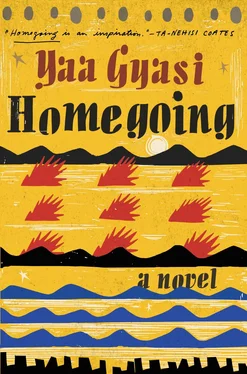The two stayed like this for a long while, and after Yaw had cried more tears than he had ever cried before, after his mother had finished calling his name out into the world, he peeled himself away so that he could look at her.
“Tell me the story of how I got my scar,” he said.
She sighed. “How can I tell you the story of your scar without first telling you the story of my dreams? And how do I talk about my dreams without talking about my family? Our family?”
Yaw waited. His mother got off the ground and motioned for him to do the same. She pointed to a chair on one side of the room, and she took the chair on the other. She looked at the wall behind his head.
“Before you were born, I began to have bad dreams. The dreams started out the same — a woman made of fire would visit me. In her arms, she carried her two fire children, but then the children would disappear and the woman would turn her anger toward me.
“Even before the dreams began, I was not well. My mother died at the hands of the Missionary at the school in Kumasi. Do you know it?”
Yaw shook his head. He had never heard this before, and even if he had, he would have been too young to remember it.
“The Missionary raised me. My only friend was a fetish priest. I was always a sad girl because I did not know that there was any other way to be. When I married your father, I thought I could be happy, and when I had your sisters…”
Here, her voice caught, but she lifted her shoulders, began again.
“When I had your sisters, I thought I was happy, but then I saw a white man burn in the square in Edweso and the dreams began. Then the war began and the dreams grew worse. Your father came back without a leg, and the dreams grew worse. I had you, and the sadness did not stop. I tried to fight sleep, but I am human and sleep is not. We were not equally matched. In my sleep one night, I set the hut on fire. They say your father could only save one, you. But that is not entirely true. He also saved me from the townspeople. For many years I wished that he had not.
“They only let me see you so that I could feed you. Then they sent you away, and would not tell me where. I have lived here in this house with Kukua since that day.”
As if summoned, Kukua, the old servant, came in with wine. She served Yaw first and then his mother, but the woman refused. Kukua left as quietly as she had entered.
Yaw drank from the wine as though it were water. When the cup lay empty at his feet, he turned his attention back to his mother. She took a deep breath and began again.
“The dreams didn’t stop. Not after the fire, not even to this day. I started to get to know the firewoman. Sometimes, as on the night of the fire, she would take me to the ocean in Cape Coast. Sometimes she would take me to a cocoa farm. Sometimes to Kumasi. I didn’t know why. I wanted answers, so I went back to the missionary school to ask about my mother’s family. The Missionary told me that he had burned all of my mother’s belongings, but he lied. He had kept one thing for himself.”
His mother pulled Effia’s necklace from her neck then and held it out to Yaw. It glowed black in her hand. He touched it, felt the smoothness of it.
“I took the necklace to the fetish man’s son so that I could make offerings to our ancestors so that they might stop punishing me. Kukua was maybe fourteen at this time. When we did the ritual, the fetish man’s son stopped. He dropped the necklace very suddenly and said, ‘Do you know there is evil in your lineage?’ I thought he was talking about me, the things I had done, and so I nodded. But then he said, ‘This thing you are carrying, it does not belong to you.’ When I told him about my dreams, he said that the firewoman was an ancestor come back to visit me. He said that the black stone had belonged to her and that was why it grew hot in his hand. He said that if I listened to her, she would tell me where I came from. He said I should be glad that I was chosen.”
Yaw grew angry again. Why should she be glad she was chosen if she was now a ruined woman and he a ruined man? How could she be content with this life?
His mother must have sensed his anger. Old woman that she was, she went to him and knelt before him. Yaw knew she was crying by the wetness of his feet.
She looked up at him and said, “I can’t forgive myself for what I’ve done. I won’t. But when I listened to the firewoman’s stories I began to see that the fetish priest was right. There is evil in our lineage. There are people who have done wrong because they could not see the result of the wrong. They did not have these burned hands as warning.”
She held her hands out to him, and he looked at them carefully. He recognized her skin in his own.
“What I know now, my son: Evil begets evil. It grows. It transmutes, so that sometimes you cannot see that the evil in the world began as the evil in your own home. I’m sorry you have suffered. I’m sorry for the way your suffering casts a shadow over your life, over the woman you have yet to marry, the children you have yet to have.”
Yaw looked at her surprised, but she simply smiled. “When someone does wrong, whether it is you or me, whether it is mother or father, whether it is the Gold Coast man or the white man, it is like a fisherman casting a net into the water. He keeps only the one or two fish that he needs to feed himself and puts the rest in the water, thinking that their lives will go back to normal. No one forgets that they were once captive, even if they are now free. But still, Yaw, you have to let yourself be free.”
Yaw took his mother up from the ground and into his arms while she kept chanting, “Be free, Yaw. Be free.” He hugged her, surprised by how light she was.
Soon Esther and Kukua came in carrying pot after pot of food. They served Yaw and his mother well into the night. They ate until the sun came up.
JAIL GAVE SONNY time to read. He used the hours before his mother bailed him out to thumb through The Souls of Black Folk. He’d read it four times already, and he still wasn’t tired of it. It reaffirmed for him the purpose of his being there, on an iron bench, in an iron cell. Every time he felt the futility of his work for the NAACP, he’d finger the well-worn pages of that book, and it would strengthen his resolve.
“Ain’t you tired of this?” Willie said when she stormed through the doors of the police station. She was holding her tattered coat in one hand and a broom in the other. She had been cleaning houses on the Upper East Side for as long as Sonny could remember, and she didn’t trust the brooms white people kept around and so she always brought her own, carrying it from subway station to subway station to street to house. When he was a teenager, that broom used to embarrass Sonny no end, seeing his mother lug it around like it was a cross. If she held it on the days she called his name while he played with his friends on the basketball court, he would deny her like Peter.
“Carson!” she’d yell, and as he answered her with silence, he would think that he was justified in not responding, for he’d long since gone by “Sonny.” He’d let her call out “Carson” a few times more before he finally said, “What?” He knew he’d pay for it when he got back home. He knew his mother would bring out her Bible and start pray-shouting over him, but he did it anyway.
Sonny took up The Souls of Black Folk while the officer opened the door. He nodded at the other men who’d been arrested during the march and brushed past his mother.
“How many times they gotta throw you in jail, huh?” Willie called after him, but Sonny kept walking.
It wasn’t like he hadn’t asked himself the same thing a hundred times or more. How many times could he pick himself up off the dirty floor of a jail cell? How many hours could he spend marching? How many bruises could he collect from the police? How many letters to the mayor, governor, president could he send? How many more days would it take to get something to change? And when it changed, would it change? Would America be any different, or would it be mostly the same?
Читать дальше

![Ally Carter - [Gallagher Girls 01] I'd Tell You I Love You But Then I'd Have to Kill You](/books/262179/ally-carter-gallagher-girls-01-i-d-tell-you-i-lo-thumb.webp)










